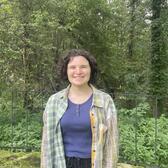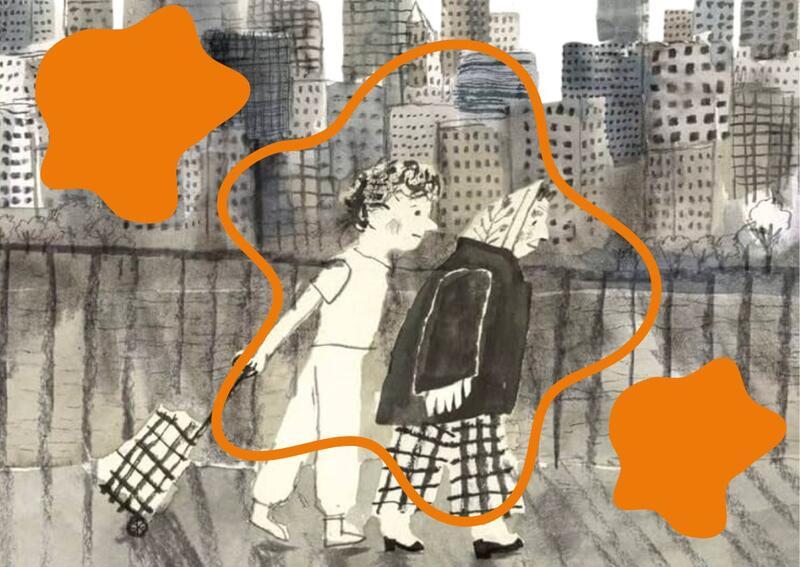Healing Trauma through Intergenerational Relationships in "Alte Zachen"
As I stepped into the public library, the warm lights quickly extinguished the melancholy grayness of the unending Seattle rain outside. “Just what I need,” I thought, checking the time, “a ten minute adventure before my bus arrives.” I rifled through the teen graphic novel shelves, looking for something to cut through the day’s gloom, until I found Alte Zachen / Old Things by Ziggy Hanaor and Benjamin Phillips. I couldn’t tell you what initially made me pick it up. Maybe I knew that once I opened it, I’d see a new perspective on a seemingly gray city. Maybe I knew that inside I’d meet people who were the product of their circumstances: of the societies they know, once knew, and must come to accept.
I brought the book to the bus, and Hanaor’s story and Phillips’s thoughtful illustrations transported me to modern day New York City, alongside Bubbe Rosa and 11-year-old Benji.The two were venturing through the city, trying to find ingredients for their Shabbat dinner. Phillips describes: “As they wander the streets of Brooklyn and Manhattan, Bubbe struggles to reconcile the world of her memories with the new realities that surround her.” Illustrations show flashbacks to Bubbe’s childhood in Nazi Germany, and the safehaven of New York through her young adulthood.
But the city grew and modernized in the seventy years Bubbe Rosa lived there, and her responses to those changes are resentful and angry. Her grandson, Benji, is patient with her, responding to her bluntness with whimsy. This portrayal of a grandparent/grandchild relationship is one of the most honest depictions I have ever seen. It adds an unexpected layer of relatability to the story, especially for readers who may not have a full understanding of older folks in their families.
Alte Zachen subverts the typical idealistic presentation of grandparents in the media. Bubbe Rosa isn’t warm and fuzzy. She doesn’t pinch Benji’s cheeks and tell him he has such a shayne punim. She lashes out at him. She tells him that he doesn’t even know what it means to be Jewish. She says,“You young people are always very rude.” She’s grumpy and frustrating, and… she’s a product of her circumstances. She struggles to embrace the new because she has been so hurt by the old. Her trauma becomes toxicity.
This idea of trauma responses and a new generation combating old foes isn’t unique to Alte Zachen. Annie Wright, a licensed therapist, writes about a similar theme in the character Abuela Alma in Disney’s Encanto. Wright shares in a blog post, “her intentions are good though her actions are misguided and informed by the past, not the reality of her present.” Wright goes on to address how Abuela’s actions portray a classic trauma response: trying to control everything and everyone. While Bubbe Rosa may not do this as explicitly—she’s more in the market of commenting on people’s choices rather than actively trying to control them—the similarly traumatic roots of these grandmothers’ actions make it difficult for them to cope with the ways the world changes.
Bubbe Rosa cannot embrace change in New York. She knows what change looked like in Nazi Germany. Emily Schneider reflects on this, and the cruel irony of the way it is introduced, in her review of Alte Zachen, “After she lashes out at a group of boys who, she claims, have learned nothing in school, the scene shifts to her own school days in Germany. As her class conjugates Latin verbs together, the principal enters to taunt them in German: ’Get out you dirty Jews! We don’t want you here.’ It becomes clear that the classical education she held up as superior to contemporary education was useless as the Nazis took power.”
Bubbe believes that if everything in New York stays the same as it was when she first moved there, she can’t get hurt. But change is inevitable, and Benji is there to ease Bubbe’s fears. His patience with her is almost unfathomable. He listens genuinely, waits calmly, and warmly apologizes to folks hurt by his grandmother’s words. After Bubbe Rosa harshly tells a young female cashier that her clothes “are a disgrace,” Benji apologizes to the cashier, and directly tells his grandmother that that wasn’t nice, and nowadays girls can “wear what they want and do what they want.” Even when Bubbe then lashes out at him, he stands his ground, while remaining respectful and loving. There is so much to take from the ways Benji interacts with his Bubbe; his remarkable patience, his open-mindedness, and his gentle attitude.
Towards the end of the book, Benji and Bubbe are sitting in a park. Before she rests her eyes for a while, Bubbe declares, “At least the sky doesn’t change.” Benji smiles as he looks around observing the young and the old, the diversity, the world as it is. When Bubbe Rosa wakes up, they venture to their last stop: Gershon the baker. Though the nature of their relationship remains unclear throughout the novel, it is clear that Rosa and Gershon were very close in their youth. In their visit to Gershon’s shop, he and Bubbe Rosa end up dancing together as Benji watches. The interaction is warm and sweet. As they dance, Rosa tells the baker, “You’re just the same as you’ve always been, Gershon.” He replies, “Some things don’t change Rosa.”
In addition to sharing these invaluable messages of patience, understanding, and unwavering love, Alte Zachen also provides a type of Jewish representation that the media tends to struggle with: balancing stories of Jewish suffering with stories of Jewish joy. Most famous pieces of Jewish media focus on suffering, displacement, and the Holocaust. While these traumatic events are undoubtedly part of our shared history, representing Jewish joy is just as crucial. Showing families celebrating, engaging with their communities, and enthusiastically embracing their Jewishness—both actively and passively—are key to maintaining a positive and realistic image of Judaism in the media.
Alte Zachen richly balances these ideas. It shows the hardships of escaping Nazi Germany, and the joys of finding a safe space to build a life and a family. One of my favorite pages, right before we see Bubbe Rosa and Gershon dancing in the bakery, shows groups of all different kinds of people dancing. We see Rosa and her husband as young adults, as well as several other characters from the novel with their respective friends and partners. As I examined the page, I was struck by the image of one couple dancing, hand in hand, both marked with yellow stars. This small example of spiritual resistance represents so much more of the reality of Jewish history than just focusing on the suffering and oppression.
Alte Zachen brings an unmatched level of honesty to its storytelling. Bubbe Rosa’s hostile responses to the changes of the city are a result of her history—a very real depiction of the behavioral and generational effects that trauma can have. This is not only relevant with Holocaust survivors and their descendants, the ways Benji responds to his grandmother’s struggles set an example of how to have patience with friends or family members who are “difficult” for reasons you may not be able to understand. While not every story about Jewish families and grandparents in general can or should be about the effects of trauma, it remains an important and deeply relevant narrative. Showing loving family connections in the face of difficulty is a great way to show readers that they're not alone, and that they don’t carry only the weight of their family’s pain, but also the comforting knowledge of family and community support.
This piece was written as part of JWA’s Rising Voices Fellowship.






